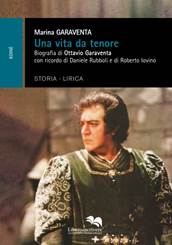
Edizione Liberodiscrivere 2015 , 324 pp, 22 Euro
ISBN 9788899137779
UNA VITA DA TENORE
Biografia di Ottavio Garaventa by Marina Garaventa

Edizione Liberodiscrivere 2015 , 324 pp, 22 Euro
ISBN 9788899137779
Click here for his youtube channel
Garaventa (1934 – 2014) grew up in a musical family and the soprano Rosetta Noli was his aunt. He initially started singing as a baritone and made his debut in 1956 as the herald in Lohengrin and not as Enrico Ashton in Lucia as stated in the Wikipedia article. This role would follow in 1957. Yet his career as a baritone (ten roles ) never really took off with only sporadic appearances. He even had to take on a job working in Genova’s harbor to make ends meet. After singing Silvio to Petrella’s Nedda in Catania in 1962 he stopped singing for a year, reworked his voice and made his debut as a tenor in a joint concert with his aunt in 1963. His stage debut was as Turiddu in Cincinatti in the same year. In 1965 his career as a tenor really started to blossom with appearances all over Italy, Austria, Germany, France, the US, Japan etc . Garaventa finished his stage career as Cavaradossi in Monza in 1996. He would still give concerts and taught voice afterwards.
There’s always a serious caveat when a biography is written by a family member yet Marina Garaventa gives an honest and unfiltered (!) portrait of her father’s career and life. The book is illustrated with numerous lovely photos which are also a blueprint of operatic life in the sixties, seventies and eighties. All praise as well to Arrigo Valesio for a superb detailed chronology moreover there’s also an index of all the colleagues he sang with. There’s a general index as well and an almost complete discography including commercial and live tapes of his performances, even internet links to youtube clips! Yet strange that the only LP of Garaventa 'da baritono a tenore' is not mentioned.
Very often it is more rewarding reading about “lesser” tenor gods as they often give a more honest account of how a career in the shark world of opera goes. Marina Garaventa’s opus on her father (who she refers to in the book as Ottavio) belongs in this category. A fine read.
Rudi van den Bulck, July 2016